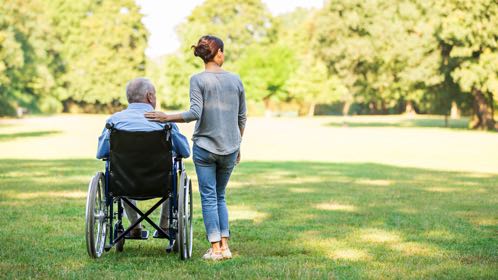How to Manage Anger and Guilt as a Caregiver

The world has been invaded by a quiet, yet violent storm and we are all reeling in different yet similar ways. Many of us are frightened and overwhelmed, some of us are sick and suffering, and grieving.
Those of us who are caring for others during this time have been challenged as never before. We might have thought we had weathered the worst of storms but we have been blindsided and nearly brought to our knees. The only saving grace seems to be that none of us are alone. This is a shared nightmare across the globe.
The emotional wave that washes over us daily is powerful and ranges from fear to grief. Some emotions are easier to navigate than others. Some feel appropriate while others make us feel broken. They make us sit in judgment of ourselves.
Anger for instance, even though completely understandable, refuses to feel like we are entitled to it. It’s hard to just let it rip and be processed like sadness or fear or guilt. There’s a stigma attached to anger that makes it an undesirable emotion, even when it’s appropriate anger that is acknowledged and expressed healthily.
All of us get angry from time to time and every caregiver out there deserves the right to feel it and heal it. When we don’t acknowledge and release anger, or worse, when we feel guilty about feeling it, it can fester into a poison that endangers us.
Anger has to be managed. Here are some of the ways I’ve learned to do it.
Acknowledge it
Don’t try to push your anger down or ignore it. Admit it and own it. Anger is normal. It can be a useful tool to respond to inappropriate social situations or uncomfortable experiences. It can be appropriate and authentic. It can even be helpful. We can discover so much about ourselves and the way we respond in our world if we are honest and curious about it once we “simmer down” as my Dad would say. Expressed properly anger can help us move forward with our lives.
Understand it
“What the heck is going on?” This is a question I often ask myself when I can feel my emotional temperature rising or when I start fuming about something.
- Sometimes my anger is less about the actual situation I’m in and more about what it triggered inside me.
- Sometimes it’s a build-up of resentments or the inability to address the way someone is treating me.
- Sometimes a situation warrants a strong reaction from me because boundaries have been crossed or someone wishes to harm me.
Poking around in my anger to get a straight answer about my reaction once I’m calm enough to think clearly, is so helpful, especially for the future.
When I don’t take care of myself I get mad at you.
Heed the warning signs
Most of us feel like we get furious or angry quickly, or out of the blue, but actually there may be warning signs that we’re not always aware of. Here’s where taking your emotional temperature and being aware of your body can be extremely helpful.
Is your heart beating fast? Is your face hot? Is your stomach churning? Have you been going over and over a situation in your mind?
When we become self-aware and begin to note how we are feeling and why we are feeling that way, it’s easier to avoid an outburst. We can take care of ourselves before we reach a boiling point.
Develop strategies
Having a plan of action ahead of time is the best way to manage anger. Knowing we can excuse ourselves from a situation and make an exit can be helpful. When the environment begins to feel tense or uncomfortable, taking a break is a great option.
Having relaxation tools at hand such as deep breathing or daily stress-reducing habits such as meditation or journaling helps diffuse tension. These practices can help get us to a calm place that allows us to discuss the issues we are struggling with. Finally, sharing our feelings with a trusted friend can be extraordinarily helpful. This allows us to feel seen and heard which is difficult to do when we are angry and seeing red.
The takeaway
Although anger is a universal emotion, caregivers suffer from its effects with a compounded discomfort. We feel guilty as well as angry, because we don’t allow ourselves to feel anger.
Grace comes when we accept that anger is not a sin, nor are we bad people for feeling it. We must be proactive and search for the best way to express our anger and be forgiving in the process. We must not only be forgiving to those who trigger us, we must forgive ourselves.
Although feeling angry can be draining and throw us off balance we are entitled to it, anger presents a chance for discussion and understanding. When we accept our anger and look to learn from it, we open ourselves up to possibility and positive change. Let’s take advantage of it and feel empowered by the lessons we learn about ourselves.












